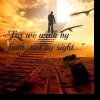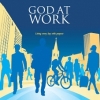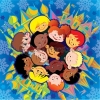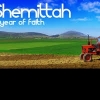| << Previous 1 - 2 - 3 - 4 - 5 - 6 - 7 Next >> |
Consider this...the Apostle Paul prayed that we would have better spiritual vision regarding three things:
1) the great “hope to which he has called” us — that we will share in his glory;
2) that our eyes would be opened to “the riches of his glorious inheritance in the saints” — that we are his treasured inheritance;
3) that his all-surpassing power is on us and will continue on to our glorification. [1]
Paul prays that our eyes will be opened as to “the riches of his glorious inheritance in the saints.” What the Apostle Paul wants us to see is that we are God’s riches — “his possession,” as verse Eph.1:14 also previously mentioned! F. F. Bruce says regarding this: "Paul prays here that his readers will appreciate the value which God places on them, his plan to accomplish his eternal purpose through them as the first fruits of the reconciled universe of the future, in order that their lives may be in keeping with the high calling and that they may accept in grateful humility the grace and glory thus lavished on them."
Think of it: The Lord owns all the heavens and numberless worlds, but we are his treasures. The “redeemed” are worth more than the universe. Paul prays that we will see this with our heart’s eyes.[2]
This “inheritance of God” encompasses the life of God’s “church gathered” as well as the life of God’s “church scattered” in the world—in the marketplace, government, professional offices, schools and homes. This “inheritance of God” is realized on earth when the people of God discover that their lives are ontologically grounded in the being of Christ as they live and mature as the children of God in their homes and marketplace. As a result, the Disciples of Christ will experience being the inheritance of God through the personhood of Christ in the world.[3] In the process, the Church prepares the way for the Lord, and becomes vital, relevant and effective to any community at any given point in human history regardless of the complex societal and cultural transformations that could take place in the world.
Jesus’ answer to Thomas is that God is found, first and foremost, not in the blinding light of the sun, nor in the majesty of mountains. He is not in the almost infinitely vast spaces of the universe, with its hundreds of billions of galaxies, each with hundreds of billions of stars. Indeed the mistake we making consists in the very fact that we are deeply involved in the things we look at all the time. God is to be found not by looking but by listening. He lives in words – the words He spoke to the patriarchs and matriarchs, prophets and priests of Israel; ultimately in the words of the Christ Himself – the words though which we are to interpret all other words.
Rabbi Jacob Leiner (1814-1878), a leader of the Hassidic community in Radzyn, Poland wrote a Biblical commentary called Bet Yaakov in which he makes a profound point about the spiritual differences between the sense of sight and the sense of listening: “From a human perspective it often seems as if seeing is a more precise form of knowledge than hearing. In fact, however, hearing has a greater power than seeing. Sight discloses the external aspect of things, but hearing reveals their inwardness. The aspect of God which prevails is haskes u-shema Yisrael hayom, ‘Be silent, O Israel, and listen’. The idea of haskes is that the person practices a self-imposed limitation on his senses, no longer looking at the events in this world and he is then able clearly to understand that ‘You have now become the people of the Lord your God’ – something one can hear during this month.”
Rabbi Leiner states that when God cannot be seen He can still be heard.Hearing represents a depth-encounter more intimate and transformational than seeing. Perhaps without intending to, the Rabbi Leiner has provided us with a point of entry into one of the most important and least understood differences between the two great civilizations of the West. Matthew Arnold, in his Culture and Anarchy, called them Hellenism and Hebraism. The political philosopher Leo Strauss spoke of Athens and Jerusalem. We know them best as ancient Greece and ancient Israel. Greece of the Fifth to Third centuries, BCE, was in many respects the greatest culture of antiquity. It excelled in art, architecture, sculpture and the theatre – the visual arts. In these it achieved a greatness never surpassed. The most glittering subsequent artistic flowering of Europe, in Renaissance Italy, was essentially a rediscovery of the world and skills of ancient Greece. Jews excelled at none of these things, yet their contribution to the West was no less great. The reason is that their interest lay altogether elsewhere, not in sight but in sound, not in seeing but hearing. Judaism is the supreme example of a culture not of the eye but of the ear. A great nineteenth century Jewish historian Heinrich Graetz explained the difference: The pagan perceives the Divine in nature through the medium of the eye, and he becomes conscious of it as something to be looked at. On the other hand, to the Jew who conceives God as being outside of nature and prior to it, the Divine manifests itself through the will and through the medium of the ear. He becomes conscious of it as something to be heeded and listened to. The pagan beholds his God, the Jew hears Him, that is, apprehends His will.
Rabbi Jonathan Sacks points out that Jewish thought and Greek words came together in the New Testament. This brought many Jewish ideas to the non-Jewish world. However, the deepest Jewish concepts were untranslatable into Greek. For almost two thousand years, Judaism has been known to the West through the filter of languages and cultures, Greek (Hellenistic) in inspiration, which simply could not express its message in its pristine form. However, we continue to learn more from modern biblical archeology and linguistic research, and we continue to grow in our understanding of the culture and community in which Jesus lived and served.
Rabbi Sacks argues, "Even to this day, when we speak about knowledge, we use metaphors overwhelmingly drawn from the world of the eye. We talk of insight, foresight and hindsight; of making an observation; of people of vision. When we understand something we say, “I see”. The very word “idea” comes from the same Latin root as the word “video”. These are linguistic vestiges of a culture essentially Greek. In the Hebrew Bible, by contrast, instead of saying that someone thinks, the verse will say that he “said in his or her heart.” Thought is not a form of sight but of speech. In rabbinic Hebrew, when we say that a certain conclusion can be drawn, we say mashma or shema mina or ta shema. When we want to say that we understand, we use the phrase shomea ani, and when someone did not accept an idea, we say lo shemia leh. Tradition is called mipi hashemua. All of these are verbs of hearing. For the Greeks, truth is what we see. For Jews, it is what we hear. Seeing, in Judaism, is ultimately about hearing. Israel is the people called on to reject images in favor of words; to discard appearances and follow, instead, the commanding Voice of the Lord."
No concept has proved more difficult to explain in modern times than the doctrine of Torah min hashamayim, “Torah from heaven.” The reason is that it has not been understood in the depth it demands. It is not simply about (though it includes) the Divine authorship of the Bible, nor is it merely (though it is also) a statement about its authority. First and foremost it is an answer to the ultimate human question: Where do we find God?
Judeo-Christianity's answer is that God is found, first and foremost, not in the blinding light of the sun, nor in the majesty of mountains. He is not in the almost infinitely vast spaces of the universe, with its hundreds of billions of galaxies, each with hundreds of billions of stars. He is not even in the letters of the genetic code that give all life its structure and diversity. If this is where you seek God, says the Bible, you are looking in the wrong place. Indeed the mistake you are making consists in the very fact that you are looking at all. God is to be found not by looking but by listening. He lives in words – the words He spoke to the patriarchs and matriarchs, prophets and priests; ultimately in the words of Christ Himself – the words though which we are to interpret all other words.
"In the beginning was the Word, and the Word was with God, and the Word was God." John 1:1
Why is God revealed in words? Because words are what makes us persons. Language makes homo sapiens unique. Because we have language, we can think. We can stand back, reflectively, from the data provided by our senses. We can ask questions. Human beings are the only species known to us in the universe capable of asking the question, Why?
Because we can speak as well as see, we can imagine a universe unlike the one we have seen every day until now. We can dream dreams, imagine alternatives, sketch utopias, formulate plans, construct intentions. Because of language – and only because of language – we are free and therefore morally responsible agents.
Judeo-Christianity is the single greatest statement in the history of civilization that personhood is at the heart of being – that it is not random, accidental, or peripheral that we are persons; that we can speak and listen; that we can communicate and be communicated with. Only human beings can grasp the concept of the holy, that which is defined in and through a relationship with God. Our relationship with God is personal, therefore verbal, a matter of speech. God as He is in Himself is beyond us; but God in relationship with humanity goes to the core of our humanity and is therefore expressed in words. Thus, in John 20:26-29, the Lord Jesus encourages us to seek God, and turn our attention to language of the Word and Spirit – not to places or objects. The hidden presence of Christ is everywhere. But the revealed presence of God is in the words He gave to humanity on the basis of which He made a series of covenants, first with Noah, then with Abraham, then with the Israelites at Mount Sinai, and finally in the New Covenant (John 13). Hence the philosophy of Israel in Christ – so different from that of ancient Greece, the European Enlightenment and contemporary science: To meet God is to listen to God, understand His Word, and walk in His Way. Just like our human words make reveal our invisble thoughts, an invisble God reveals Himself to us through His Spoken Word - the Bible. To see God is to live by faith in His Word and NOT by sight on the temporal objects and places of our age (2 Cor.5:7).
Adapted from the following Sources:
- http://www.rabbisacks.org/covenant-conversation-5768-reeh-seeing-and-hearing/
- http://www.rabbisacks.org/vaetchanan-5767-listen-o-israel/
Not only will you and I one day die by reason of physical death, our lives are impacted by death-dealing things that happen in this world—things that erode hope, suffocate confidence, break hearts, and kill relationships. You can be alive but things “die” along the way—a business goes bad, a marriage is stressed, a goal you’ve worked toward isn’t realized.
The Scripture says that in the human race (“Adam’s race”) all die. And that is true not only at the end of our lives, but also with the intrusion of death-dealing forces going on around us all the time. But it also says that “in Christ all shall be made alive.” The promise of the Resurrection—to forever to be with the Lord in heaven—is real. But the grammar of these words refers to a continuous action—that all in Christ are continually being made alive. The good news is that Jesus’ resurrection life not only applies to eternity, but also to the present moment in which you and I live.
I want you to look with me at three resurrections that Jesus performed during His ministry, before His own death and resurrection. In the first case, He happened to come upon a funeral. In the second, He didn’t respond to the emergency call of a friend and her brother died. The third is about a man whose daughter died, and Jesus was told, “It’s no use. She’s gone.” But He went anyway.
What I want you to note in these three stories are the responses of the people who were impacted by the death that occurred, because it is the same hopelessness and confusion that Jesus wants to do away with in our lives. All three episodes illustrate how the forces of death intrude on life, and how, by His resurrection power, Jesus turns death backwards, along with the mistaken and fatalistic responses that come with it.
Jesus can reverse the death-dealing power of a hopeless future.
The Widow of Nain and Her Son (Luke 7:11-17)
In the first story, Jesus enters the city of Nain and comes upon a funeral. The text says that “a dead man was being carried out, the only son of his mother; and she was a widow. And a large crowd from the city was with her. When the Lord saw her, He had compassion on her and said to her, ‘Do not weep.’ Then He came and touched the open coffin, and those who carried him stood still. And He said, ‘Young man, I say to you, arise.’ So he who was dead sat up and began to speak. And He presented him to his mother.”
Jesus knew that the widow was not only crying because her son died. She was also grieving because her son would have been old enough to be a wage-earner. He was the hope of their family’s future because in the culture of that time, a widow usually ended up a beggar. Her tears were at the thought she would need to spend the rest of her life sitting in the marketplace and begging alms to survive.
The futility of that circumstance adds dimension to Jesus’ words, for the Bible says He had compassion. His desire was not simply to alleviate her grief, though I’m not suggesting He was passive concerning that. What I’m saying is that there was a larger issue at stake that had to do with the possibility of a hopeless future .
Death is more than just ending up in a box in a hole. Death has to do with things that rob our sense of security, things that intrude upon our lives. Many of us can testify to a time when Jesus met us with the power to reverse what looked futile and hopeless at the time. Where He stepped in, and the power of the living God transcended anything we could bring about on our own. Jesus’ resurrection will reverse the death-dealing power of any hopeless future—long- or short-term—that you or I face.
Jesus can reverse the death-dealing power of confused thinking about God.
Lazarus (John 11:1-44)
Lazarus, Mary, and Martha—a brother and two sisters—were good friends of Jesus. He was some distance away when a report came from the sisters that Lazarus was very sick and in jeopardy of losing his life. But Jesus didn’t go to them right away, and His disciples asked why. Jesus gave them a temporary explanation, because the disciples were going to have to learn the same thing as the sisters would learn. And that has to do with the human tendency to become confused about how we think about God when He doesn’t do things as fast as we think He should.
By the time Jesus arrived, Lazarus had been dead for four days. The Scripture says that when Martha heard Jesus was coming, she went out and met Him, saying, “Lord, if You had been here, my brother wouldn’t have died.”
I’m sure she said it politely, but there must have been an edge to her words. We were counting on You. And nothing happened. If we believe God exists, our human tendency is to think that if we ask, and hope, and do everything we know to implore God, what we expect should happen. We live in a world that will pass judgment on God if He doesn’t show up at the beck and call of every human circumstance, as though He doesn’t have the power, doesn’t love us, or doesn’t exist.
Those are the judgments people make about God which will crowd in on our hearts and shut Him out. We may never say it to anyone, or have the nerve to do what Martha did—to tell the Lord Himself, You let me down. I was counting on You. We carry that confusion inside ourselves. I’m just bewildered, Lord. Bewildered as though we suppose we should understand everything of God’s timing.
One of the most necessary things for us to learn is that we cannot judge God’s interest in us by the way we judge His timing. Let me say that again: We cannot judge God’s interest in us by the way we judge His timing. If the answer doesn’t come when we think it should, the conclusion is drawn that either He’s deficient in His character, or there must be something wrong with us. That causes us to live with guilt, or to steep ourselves in frustration, anger, and resentment toward God, even outright rejection of Him.
Jesus said to Martha, “Your brother will rise again,” to which Martha replied, “I know my brother will rise in the resurrection at the last day.” And Jesus said to her, “Martha, I am the resurrection and the life. ” Right now, Martha, I AM the resurrection and the life!
Martha responded the way some Christians do. Well, Lord, it didn’t work out, but someday, somewhere, somehow, I guess it will. As though God has no resurrection power to bring us through whatever turns a situation into a dead one. Not dead in the way that Lazarus physically died, but in a way that kills feelings in our heart, annihilates trust in our soul, or stifles our readiness to move on in confidence. Yet Jesus’ resurrection confirms with dynamic evidence His ability to turn death backwards—to reverse the death syndrome that intrudes on our lives with confused thinking about God and how He feels about us.
Jesus can reverse the death-dealing power of fatalistic prophecy.
Jairus’ Daughter (Luke 8:40-56)
Jairus, who was the leader of a synagogue, had a twelve-year-old daughter who was dying, and he came to Jesus and begged Him to come to his house. But as Jesus went with Jairus, they were besieged by a crowd; “multitudes thronged Him,” the Bible says. Among them was a woman who had endured a horrible and embarrassing discharge of blood for twelve years. The text says she had “spent all her livelihood on physicians and could not be healed by any.” She pressed in through the crowd and touched the bottom of Jesus’ robe and instantly, she was healed.
But by then, they had been delayed in getting back to Jairus’ house, and someone comes to tells them not to bother, it’s too late. “Your daughter is dead,” he says to Jairus. “Do not trouble the Teacher.” He renders a fatalistic prophecy in the light of the moment. There would be no future, no possibility for anything changing. But Jesus answers with another prophecy: “Do not be afraid; only believe, and she will be made well.” He goes to the house where He tells the mourners to stop their crying. Taking the daughter’s hand, Jesus says, “Little girl, arise,” and the Bible says, “her spirit returned, and she arose immediately.”
The passage ends by saying, “And her parents were astonished...” They had thought, The prophecy has been made, there’s no reason to expect anything now. We had a plan, but it didn’t work. Yet Jesus confirms that He can reverse the death-dealing power of fatalistic prophecy.
Perhaps you have said fatalistic things about your future, a limitation due to circumstances, as you see them. Perhaps, as a kid, you were told by someone, It’s no use, you’ll never be anything, and it’s affected you for a lifetime. A teacher scorned you. A friend mocked you. Kids gave you a bad time. As an adult, you were devalued on the job. Those things can shape our lives and cause us to draw conclusions about ourselves.
Loved one, I’d like to ask you to see what God says to you personally about how each of these three stories applies to your life. What may have taken place that now is reflected in a hopeless future? Have you given up on God because He didn’t show up when you thought He should? Are you frustrated with or angry at Him because what you were hoping for didn’t happen? What fatalistic prophecy has been made about your life that has allowed something of the death syndrome to take root?
As we celebrate Easter, I want you to know that there’s a different kind of prophecy that governs our lives as believers in the living God: it’s the prophecy that Jesus Christ is alive! He came not only to bring us life when we open to Him as Savior, but also to bring hope in the face of a future we can’t imagine, and recovery when we think He’s let us down. By His resurrection power, He can reverse circumstances and turn death backwards whenever and wherever it tries to encroach upon the abundant life He’s promised to you and me. For He proclaims to all, “I AM the resurrection and the life.”
An Article by Lord Jonathan Sacks
(First published in The London Times, January 2008)
1. Give thanks. Once a day take quiet time to feel gratitude for what you have, not impatience for what you don’t have. This alone will bring you halfway to happiness. We already have most of the ingredients of a happy life. It’s just that we tend to take these for granted and focus on unmet wants, unfulfilled desires. Giving thanks is better than shopping – and cheaper too.
2. Praise. Catch someone doing something right and say so. Most people, most of the time, are unappreciated. Being recognised, thanked and congratulated by someone else is one of the most empowering things that can happen to us. So don’t wait for someone to do it for you: do it for someone else. You will make their day, and that will help to make yours.
3. Spend time with your family. Make sure that there is at least one time a week when you sit down to have a meal together with no distractions – no television, no phone, no e-mail, just being together and celebrating one another’s company. Happy marriages and healthy families need dedicated time.
4. Discover meaning. Take time out, once in a while, to ask: “Why am I here? What do I hope to achieve? How best can I use my gifts? What would I wish to be said about me when I am no longer here?” Finding meaning is essential to a fulfilled life – and how can you find it if you never look? If you don’t know where you want to be, you will never get there, however fast you run.
5. Live your values. Most of us believe in high ideals, but we act on them only sporadically. The best thing to do is to establish habits that get us to enact those ideals daily. This is called ritual, and it is what religions remember but ethicists often forget.
6. Forgive. This is the emotional equivalent of losing excess weight. Life is too short to bear a grudge or seek revenge. Forgiving someone is good for them but even better for you. The bad has happened. It won’t be made better by your dwelling on it. Let it go. Move on.
7. Keep learning. I learnt this from Florence in Newcastle, whom I last met the day she celebrated her 105th birthday. She was still full of energy and fun. “What’s the secret?” I asked her. “Never be afraid to learn something new,” she said. Then I realised that if you are willing to learn, you can be 105 and still young. If you are not, you can be 25 and already old.
8. Learn to listen. Often in conversation we spend half our time thinking of what we want to say next instead of paying attention to what the other person is saying. Listening is one of the greatest gifts we can give to someone else. It means that we are open to them, that we take them seriously and that we accept graciously their gift of words.
9. Create moments of silence in the soul. Liberate yourself, if only five minutes daily, from the tyranny of technology, the mobile phone, the laptop and all the other electronic intruders, and just inhale the heady air of existence, the joy of being.
10. Transform suffering. When bad things happen, use them to sensitise you to the pain of others. The greatest people I know – people who survived tragedy and became stronger as a result – did not ask “Who did this to me?” Instead, they asked “What does this allow me to do that I could not have done before?” They refused to become victims of circumstance. They became, instead, agents of hope.
Most of these are, of course, integral elements of a religious life, which may be why so many surveys have shown that those who practise a religious faith tend to live longer, have lower levels of stress and report higher degrees of wellbeing than others. This is not accidental. The great religions are our richest treasuries of wisdom when it comes to the question of how best to live a life.
Life is too full of blessings to waste time and attention on artificial substitutes. Live, give, forgive, celebrate and praise: these are still the best ways of making a blessing over life, thereby turning life into a blessing.
Reference:
Can this be true?
I don’t think so!
In 2005, a movie entitled “The Passion “was released that chronicled the last twenty-four hours before the crucifixion of Christ. During a flashback scene, Jesus was seen in his carpentry shop making a table with his mother standing by playfully observing his work. It was a very beautiful scene that reminds us that Jesus was a carpenter for most of his adult life. In fact, Jesus was more qualified to be a carpenter than the Son of God in the eyes of the people because that is the history they knew of this young working class man named Jesus from Nazareth.
Consider that in the New Testament of Jesus' 132 public appearances, 122 were in the marketplace. Of 52 parables Jesus told, 45 had a workplace context. Of 40 miracles in the book of Acts, 39 were in the marketplace. Jesus spent his adult life as a carpenter until age 30 before he went into a preaching ministry in the workplace. And, 54% of Jesus' reported teaching ministry arose out of issues posed by others in the scope of daily life experience. Saint Bonaventure said, "His doing nothing 'wonderful' (his first 30-years) was in itself a kind of wonder."
Work, in its different forms, is mentioned more than 800 times in the Bible -more than all the words used to express worship, music, praise, and singing combined. God created work and He is a worker. "My father is always at his work to this very day, and I too, am working" (John 5:17). When it came time to recruit those for whom the Church would be founded, He chose twelve men from the workplace - a fisherman, a tax collector, a doctor, and so on. So, the next time you are tempted to minimize your daily work as anything less than a holy calling, remember that Jesus was a workplace minister as a carpenter in his community. He has called you and I to reflect His glory in our daily work.
Our work is a representation of our Christian Character. It speaks volumes as to who we really are when it really matters. When Jesus came to earth, how did He come? He came as a carpenter. He was a man given to work with his hands and to provide an honest service to his community.
Listen to the comments of the Nazareth Community when Jesus returns home as an Anointed Rabbi…
"Isn't this the carpenter? Isn't this Mary's son and the brother of James, Joseph, Judas and Simon? Aren't his sisters here with us?" And they took offense at him.” (Mark 6:3).
Commenting on this text in "The Beauty of Spiritual Language: Unveiling the Mystery of Speaking in Tongues" (pp. 52–54), Jack Hayford writes:
“…It was Joe Blinco, the beloved former associate of the Billy Graham Evangelistic Association, later executive director of Southern California’s Forest Home Conference Center, who addressed this issue of Christian dependability so pointedly. I was one of a thousand pastors present when Joe drew our attention to Mark 6:3. “Isn’t this man THE carpenter, the son of Mary?” He commented: "It’s worthy of our attention to note that this passing reference to Jesus, with direct reference to His profession as a carpenter/contractor, contains the Greek definite article—He’s called THE carpenter. The intent could so easily be overlooked, but let me cast it for you in words we can remember. The inquirers are saying something very direct, but within their remark is an indirect statement about Jesus as a part of the professional community. He was THE carpenter in Nazareth; as though one might say, “If you’re looking for someone who’ll do a reliable job, who is dependable as a worker, the carpenter you want in this town is a specific one—His name is Jesus, Joseph’s son. If he quotes a price, he’ll stick to it; if he says he’ll be there at 8 A.M., he’ll be on time; and if he promises a quality job, you can be sure you’ll get it.”
Jesus’ work as a Carpenter was a representation of His Character. So, when He preached THE WORD of God, people were more likely to believe Him because it was backed up his integrity, honesty and excellence in the workplace. Jesus truly walked in the Truth, and there was NO disconnect between His sacred and secular life. It was all holy and dedicated to the Lord.
So before we preach let’s allow our light to shine, especially in our homes, schools, businesses, workplaces, etc… just like Jesus :-) NOT is our own strength But by the power of the Holy Spirit (2Tim 1:7)
References:
- Jack Hayford, (1996). "The Beauty of Spiritual Language: Unveiling the Mystery of Speaking in Tongues" (pp. 52–54). Nashville; Atlanta; London; Vancouver: Thomas Nelson.
- Os Hillman Devotionals “Today God is First” January 2015 Series
That "greatest fact" is worth receiving as a reminder that Christmas' celebration never need be argued against because "it costs so much." Decorating and celebrating—giving and receiving gifts at this season—are not unworthy practices (as though "spending" at Christmas was merely "commercial").
It's not so, loved one. Never let yourself become snared in that cynical trap! Christmas has always been costly—from the very beginning, in fact. It cost Heaven everything! Bethlehem's barnyard cradle wasn't the only sacrifice. It was simply the original packaging for the treasure that Heaven's heart was giving us. The Cross was the real price of Christmas, for it was wrapped in the Gift from the start—a Gift that was marvelously and mysteriously provided for and pre-paid from before all time! (1 Peter 1:20; Revelation 13:8).
So it was, the Christmas Child came to us. And in light of appropriately evaluating that costly gift, everything in me wants to answer a call I hear the Spirit whispering this season. He's summoning me—can you hear Him too? He's calling us to "spend big" this season—to do so in a dynamic and holy way that answers to one of this season's most common maxims: "Christmas is for children." It's a common sentiment, but join me in probing more deeply its meaning in the light of Heaven's gift of the Child.
Join me in "spending" whatever needs to be "laid out or laid down" for God to find in me another "child of Christmas." I want the willingness of His only begotten Son—a willing readiness to go, to love, to serve, to give, and to care for human need and brokenness—to be replicated in me.
Do you feel it with me?
I believe you do...and accordingly, let me urge you to join me in this prayer reflecting a childlike response to the Father's search for those who will "spend as He spent" for Christmas:
Father, I am Your child-created by Your hand, designed for delight and desirable destiny, and immensely loved and restored through Your Son Jesus, Your first Christmas Child.
Now, dear Father, I'm asking you to make me a child after Your own heart, this Christmas and beyond it. As I bow now, with humility and gratitude, and with the joy born in me which springs from your gift to us in Jesus, I pray: Help me pay the price of becoming truly childlike at Christ-like dimensions of trust and self-giving. Help me lay down my all, Lord, that the Child of Christmas be multiplied in me...and thereby You gain a harvest of children at this Christmas time, and for seasons to come.
Dear one, put your "Amen" on that prayer along with mine, would you? Let's move into this season with the spirit of childlikeness, manifesting in ways that cause our Father and His Child, Jesus, to see the joy and blessing of Christmas multiplied in us—the "children of Christmas."
Website: http://www.jackhayford.org/teaching/articles/the-children-of-christmas-and-the-child-of-christmas/
Copyright © 2003, 2011 by Jack W. Hayford, Jack Hayford Ministries. All rights reserved.
Today I want to encourage you to reflect on the words of our Lord in 1 Corinthians 11:23-26, especially the word: “REMEMBRANCE”
“…The Lord Jesus, on the night he was betrayed, took bread, and when he had given thanks, he broke it and said, “This is my body, which is for you; do this in remembrance of me.” In the same way, after supper he took the cup, saying, “This cup is the new covenant in my blood; do this, whenever you drink it, in remembrance of me.” For whenever you eat this bread and drink this cup, you proclaim the Lord’s death until he comes.”
The Lord asks us to “REMEMBER” His work for us. Biblical Hebrew has no word that means “history” (the closest equivalent is divrei hayamim, “chronicles”). Instead Biblical Hebrew uses the root zakhor, meaning “memory.”
There is a fundamental difference between history and memory. History is “his story,” an account of events that happened sometime else to someone else. Historia is a Greek word meaning inquiry. The same word comes to mean, in Latin, a narrative of past events. However, MEMORY is “my story.” It is the past internalized and made part of my identity. So, during this thanksgiving season, REMEMBER His work of grace and glory in your family and you…make it part of your identity.
At your thanksgiving table, I encourage all of you to read Psalm 107 as an offering of thanksgiving to the Lord. Psalm 107, a song on the theme of giving thanks, beginning with the best- known words of gratitude in Hebrew: Hodu la-Shem ki tov, ki le-olam chasdo, “Give thanks to the Lord for His loving-kindness is forever”.
(BTW, a snippet of American History…Fleeing from persecution in England, the Pilgrim passengers on the Mayflower brought along their main source of spiritual inspiration and comfort: the Bible. One particular edition of the Bible (published in 1618) is known to have been in the possession of none other than William Bradford, who would later serve as governor of Plymouth Colony. Shortly after their arrival in November 1620, William Bradford led the new arrivals to the American colonies in thanking God for the safe journey that brought them to America by reciting verses from Psalm 107. )
Psalm 107 describes four (4) specific situations in which the Lord has provided His grace and glory to His people:
1. Crossing the sea:
“Some went out on the sea in ships; they were merchants on the mighty waters . . . They mounted up to the heavens and went down to the depths; in their peril their courage melted away . . .Then they cried out to the Lord in their trouble, and he brought them out of their distress. He stilled the storm to a whisper; the waves of the sea were hushed.”
2. Crossing a desert:
“Some wandered in desert wastelands, finding no way to a city where they could settle. They were hungry and thirsty, and their lives ebbed away. Then they cried out to the Lord in their trouble, and he delivered them from their distress.”
3. Recovery from serious illness:
“They loathed all food and drew near the gates of death. Then they cried to the Lord in their trouble, and he saved them from their distress. He sent forth his word and healed them; he rescued them from the grave.”
4. Release from captivity:
“Some sat in darkness and the deepest gloom, prisoners suffering in iron chains . . . Then they cried to the Lord in their trouble, and he saved them from their distress. He brought them out of darkness and the deepest gloom, and broke away their chains.”
Wherever this Psalm 107 finds you today, I want you to know that God is still on His throne! He has not changed! His power has not waned. He is still the God Who saves!
Whenever someone has done us a favor, given us a gift, comforted us in the midst of grief, or rescued us from danger. We owe them something. That “something” is todah, the Hebrew word that means both “acknowledgement” and “thanks”. It is a time to be thankful. The pathway toward health and wholeness always begins with being thankful.
To be a Christian is to feel a sense of gratitude; to see life itself as a gift; to be able to live through suffering without being defined by it; to give hope the victory over fear. To be a Christian is to offer thanks to God, and to our community.
Precious ones, read this Psalm 107 aloud at your Thanksgiving feasts. REMEMBER the Lord’s grace during this past year in your family, faith, friends and finances, and REJOICE.
Victoria and I love you all VERY much.
May the Lord bless you and keep you! May the Lord make His face shine upon you and be gracious to you! May the Lord turn His face toward you and give you Shalom. :-)
Your "thankful" servant…Pastor Moh
References:
http://www.rabbisacks.org/covenant-conversation-5770-tsav-give-thanks/
http://www.jewishideasdaily.com/1011/features/thanksgiving-a-jewish-holiday-after-all/
http://www.sermonnotebook.org/old%20testament/Psalm%20107_1-8.htm
Our Jewish neighbors have just celebrated Rosh Shanna (a new calendar year), and in their tradition it is the year 5775. It is the calendar of the early Jewish community – the community of our Lord Jesus Christ.
It is a very sepcial year for the Lord's grace and miracles in our lives!
Let me explain...
As soon as the Israelites settled in the Holy Land of Israel, they were supposed to count and observe seven-year cycles (Leviticus 25; Deuteronomy 15). Every seven-year cycle would culminate in a Sabbatical year, known as Shemittah, literally: “to release.”
The year following the destruction of the Second Temple in Jerusalem by the Romans was the first year of a seven-year Sabbatical cycle. In the Jewish calendar that was the Jewish year 3829 – this corresponds to 68–69 CE on the secular calendar. By counting sevens from then, we see that the Jewish year 5775 is a Shemittah Year and this runs from Sept. 25, 2014, through Sept. 13, 2015.
The Shemittah Year is a Sabbath Year. We have officially entered a Shemittah Year. For Christians, it is a year is to commune in the special grace from the Lord of the Sabbath – Jesus the Christ.
So, what is this special grace we are called to commune with in this Shemittah (Sabbath) Year? How does that work?
Let me clarify...
From God’s point of view, the Sabbath was the seventh day. From the point of view of the first human beings – created on the sixth day – the Sabbath was the first. So, how does the Sabbath serve us?
Well...when it comes to Divine creation, there is no gap between intention and execution. God spoke, and the world came into being (Genesis 1-2). Isaiah speaking by the Holy Spirit says: "I make known the end from the beginning, from ancient times, what is still to come. I say: My purpose will stand, and I will do all that I please.". (Isaiah 46: 10)
God knows in advance how things will turn out. With human beings, we cannot see the outcome at the outset. A great novelist may not know how the story will turn out until he or she has written it, nor a composer, a symphony, nor an artist, a painting. Creativity is fraught with the risk. All the more so is it with human history. The “law of unintended consequences” tell us that revolutions rarely turn out as planned. Policies designed to help the poor may have the opposite effect. F.A. Hayek coined the phrase ‘the fatal conceit’ for what he saw as the almost inevitable failure of social engineering – the idea that you can plan human behavior in advance. We can’t!
So, we may be tempted to simply let things happen as they will. Precious ones, this kind of resignation and apathy will rarely result in a happy ending. The other solution – given in the Bible – is to reveal the end at the beginning. That is the meaning of the Sabbath. The Sabbath is not simply a day of rest; it is an anticipation of ‘the end of history’, the messianic age of Christ, the King of Kings.
The Sabbath is a full dress rehearsal for an ideal society that has not yet come to pass, but will happen in the future, because we know what we are aiming for – because we experienced it at the beginning. On it, we recover the lost harmonies of the Garden of Eden. We do not strive to do; we are content to be. We are not permitted to manipulate the world; instead, we celebrate it as God’s supreme work of creation and community. We are not allowed to exercise power or dominance over other human beings, nor even domestic animals. Rich and poor inhabit the Sabbath alike, with equal dignity and freedom.
This is the reason why the Jewish community rehearses it every week, one day in seven. This is the meaning of the “REST” – our Lord Jesus promised to give us in Matthew 11:25-30. The Sabbath is full of mercy, grace and healing (Matthew 12:1-21) which we receive and give to one another in this world as a sign of things to come (Matthew 12:8)
Hence, in this Shemittah Year (2014-2015), there are TWO (2) Specific Things that the congregation of the Shepherd’s House is called by the Holy Spirit to act between Sept. 25, 2014 and Sept. 13, 2015.
(1) Give Your Family and Friends a Break
At the end of seven years you will make a release. And this is the manner of the release: to release the hand of every creditor from what he lent his friend; he shall not exact from his friend or his brother, because the time of the release for the Lord has arrived. (Deuteronomy 15:1-2)The Shemittah year waives all outstanding debts between debtors and creditors. So, if there are any out standing debts between you and someone in your community, FORGIVE THEM! Let it GO! The Lord will bless you back abundantly if you release the debts in the Lord’s presence, and tell your friend or family that you’ve released them from these debts (Matthew 6:12).
(2) Refocus on the Word of God
For six years you shall sow your field, and for six years you shall prune your vineyard, and gather in its produce. But in the seventh year, the land shall have a complete rest, a Sabbath to the Lord; you shall not sow your field, you shall not prune your vineyard, nor shall you reap the aftergrowth of your harvest . . . And [the produce of] the Sabbath of the land shall be yours to eat for you, for your male and female servants, and for your hired worker and resident who live with you . . . (Leviticus 25:3-6).During the Shemittah year, the residents of the Land of Israel were commanded to desist from cultivating their fields. They were also called to relinquish personal ownership of their fields; whatever produce grows on its own is considered communal property, free for anyone to take. This aspect of the Shemittah year is known as “release of the land.” In ancient Hebrew agrarian culture, the Shemittah year called for people’s collective trust in the Creator, the One who bequeathed them the land of" milk and honey." The nation of Israel collectively took a breather and focused on higher, more spiritual goals—as the people packed the synagogues and study halls to focus on the Word of God.
Even today, when the vast majority of Christians are not involved in the farming industry, the lessons of Shemittah are very germane. During this holy Shemittah year we are expected to concentrate more on our spiritual mission in life, and a little less on our material pursuits. More on why we are needed, less on what we need. More on faith in Christ, less on faith in our own talents and abilities
So, set apart time during this Shemittah Year to fast, pray, love, read, reflect and meditate on God’s Word. Together we can hear the Word, and we can do it!
Adapted from:
- http://www.chabad.org/library/article_cdo/aid/562077/jewish/What-Is-Shemittah.htm
- http://www.rabbisacks.org/covenant-conversation-5769-ki-tisa-the-sabbath-first-day-or-the-last/
The text instructs children, at any age, to seek the advice from their parents and grandparents—obliging the younger generations to seek the wisdom of those who preceded them.
BUT what happens when the children are not willing to listen to the advice of their elders?
A great parenting lesson comes from the Hasidic tradition. It speaks of a father who comes to his Rabbi, the Baal Shem Tov, with a problem concerning his son. He complains to the Rabbi that his son is forsaking Judaism and all that he had taught him. What should he do? The Rabbi, Baal Shem Tov answers, ″Love your son MORE.″
At the Baptismal Waters of the Jordan River (Luke 3:21-22), the Father tells His Son, the Christ: “This is my SON in whom I am well pleased.” This affirmation by the Father provides us with simple guidelines for our parenting lifestyle::
- You cannot relate to your children if you do not love them in word and action
- You cannot expect your children to listen to you if you do not listen to them.
- You cannot expect to listen to your children if you are not interested in them.
- You cannot be interested in your children if you do not celebrate and affirm them.
The key to all four of these parenting guidelines is to be completely present with our kids in the moment. And this requires that we listen to them with all our heart and soul.
Our pastor often said, ″God gave us two ears and one mouth so we would listen twice as much as we speak.″ ″Give ear (Haazinu), O heavens, let me speak; let the earth hear the words I utter!″ (Deuteronomy 32:1). Haazinu reminds us to listen. In fact, haazinu literally means ″to give ear.″ And when we truly listen, we become living models of grace and humility.
Our generation may be able to do "it″ (whatever the "it" may be?) faster, smarter, or even better than those who came before us. But that does not mean that we are better off than our previous generations. We must learn from those who had gone before us, and we must teach our kids how to listen to those who had gone before them. This will provide a spiritual link of wisdom between the past, present and future. My favorite poet William Wordsworth once said, “Life is divided into three terms - that which was, which is, and which will be. Let us learn from the past to profit by the present, and from the present, to live better in the future.”
We do not live in a vacuum. The generations that preceded us, and those who will follow us can only truly be a part of us when we invite them into our lives (Hebrews 11:39-40). We are obliged to look back, open ourselves up, and listen to the wisdom of our roots. At the same time, we are to look forward, and teach our children the wisdom of their fore-fathers and fore-mothers. This provides a spiritual chain-link of wisdom and blessing between the past, present and future.
By the way, the blessing comes into our lives in our generation when we are able to add our own "wisdom-links" to the chain, building on the wisdom our ancestors left for us, and passing it on to future generations.
Adapted from:
Craig Taubman, The Modern Men's Torah Commentary: New Insights from Jewish Men on the 54 Weekly Torah Portions
So, what should be our “appropriate response” according to the Word of God to these Signs in the Heavens during the Jewish Feasts Passover and Sukkoth of 2014-2015?
Here is my pastoral direction to TSH...
Since the Creation, God made the sun and the moon "for SIGNS and for seasons" (Gen 1:14). The Lord Jesus personally taught that in addition to great earthquakes, famines, and pestilence, there would be "And there shall be signs in the SUN, and in the MOON, and in the STARS," (Luke 21:25). The Prophet Joel said that these signs in the sky will foretell the great day of the Lord. It was the Magi in the Gospel of Matthew who read the signs in the heavens and saw the hand of God on earth in their generation. Similarly, in our generation these signs in the heaven during the Jewish Festivals must guide us to see what the hand of the Lord is doing in our generation, and partner with Him in the here and now.
The words of the Jewish Talmud (Jewish Book of Tradition and Commentaries on the Bible) can give Judeo-Christians some insight on how we should relate to all possibilities and speculations: “When the Jews perform the will of God, they need not worry about omens [or celestial phenomenon]. Thus says the Lord ‘Do not be frightened by the signs of the heavens.’” (Talmud Sukkah 29a).
Hey, we may not comprehend the full significance of these signs, but any way you look at it, it is a sign to look beyond the muddle of daily existence to faithfully live for Jesus Christ, knowing that He is coming soon! "When these things begin to come to pass, then look up, and lift up your heads; for your redemption draws near," Luke 21:28.
Now, let’s look at a major prophecy by the Apostle Peter in the New Testament regarding the Red-Blood Moon...In Acts 2:14-21, the Apostle Peter (on the day of Pentecost) proclaims that the “Outpouring of the Holy Spirit” was the fulfillment of the prophetic words spoken by Joel, the prophet to Israel. Joel sees the day when the dream and desire of Moses would be fulfilled - (Moses did say, “Would that all God’s people were prophets,” [Numbers 11:29] but this was his wish...) Peter also points out that the “signs in the heavens” (Acts 2:20) – the Solar Eclipse and the Red-Blood Moon as a Sign to Israel – should propel us to obey and fulfill the will of God through Evangelism in our individual and collective lives. In this way, the “unsaved” will come to know God and call upon His Name (Christ Jesus) to be saved!
Peter boldly proclaims that God has broken the sin and satanic barrier which stood in the way of all humanity, and is now pouring out His Spirit on all those who seek Him. The outpouring of the Spirit is for the “healing of the nations” - Tikkun Olam (Repairing the broken Universe) (John 20:21-22). In this new way of Christ (Acts 2:14-21), God would heal the world through His prophetic words and works through His people!
Judaism is unusual in that it recognizes not one form of spiritual leadership but two: the navi and the kohen, the prophet and the priest. The figure of the prophet has always captured the imagination. He (or she) is a person of drama, “speaking truth to power,” unafraid to challenge kings and courts, or society as a whole, in the name of the God of Israel. No other type of religious personality has had the impact on Israel as the prophets of Israel. The priests, by contrast, were for the most part quieter figures, apolitical, serving in the Sanctuary rather than in the spotlight of political debate. Yet the priests, no less than the prophets, sustained Israel as a holy nation. However, prophets brought about structural changes in Israel through works of social justice, charity, faith, etc.
Dietrich Bonhoeffer reminded the Church that true discipleship is conformity to Jesus Christ as a contemporary presence leading us into the world. This occurs through the power of the Holy Spirit. Prophetic Ministry of Acts 2:14-21 has always been grounded in the praxis of following Christ into the world. This means men and women “being” in Christ, and working on everyday problems such as childcare, education, pollution, food distribution, injustice, genetic engineering, and proliferation of violence and weaponry—knowing that this work is holy and good, possessing the transforming power of the Kingdom of God. It will become God’s pathway for affirming and expounding the truth of who God is, and what God wishes to reveal through what He has said and done, and what God is saying and doing in the world today.
So what does it mean when the Apostle Peter says “...I will pour out my Spirit on all people. Your sons and daughters will prophesy... Acts 2:17) It means that in the process of following our God given purpose in this world through our church and daily work, we can “heal our little slice of the universe” in our generation.
Each of us is responsible to heal our little slice of the universe (Tikkun Olam – John 20:21-22). In the process of engaging in the mission of God, the people of God (men and women as seen in Acts 2:14-21) become “prophetic” by healing their world. So, Judeo-Christians enter the world not only to speak but to listen, not only to serve but to be served, not only to give but to receive.”
So, what does the sign of the Four Red-Blood Moons during the four Jewish Festivals in 2014-15 direct us to do? IT"S A SIGN FOR US TO OBEY THE WORD OF GOD...It is a SIGN to get-off our blessed assurances, and obey the will of God and follow the Spirit of God to proclaim Christ to our community through works of social justice and charity (Tzedakah). Time is short – the Lord is coming (James 5:7-9)!
Now go do something for the Lord that brings peace and healing in your "slice of the universe" starting NOW...until He comes back...whenever that is...
Resources:
Rabbi Jonathan Sacks. Exodus: The Book of Redemption (Covenant & Conversation)
Ray Anderson, The Soul of Ministry
http://unitedwithisrael.org/the-blood-moon-and-jewish-destiny/
http://kenraggio.com/KRPN-BloodRedMoon.htm
http://www.cbn.com/cbnnews/insideisrael/2014/February/Divine-Sign-for-Israel-Hagee-Explains-Blood-Moons/
| << Previous 1 - 2 - 3 - 4 - 5 - 6 - 7 Next >> |









